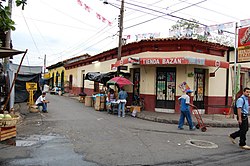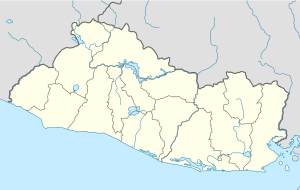The history of El Salvador begins with several Mesoamerican nations, especially the Cuzcatlecs, as well as the Lenca and Maya. In the early 16th century, the Spanish Empire conquered the territory, incorporating it into the Viceroyalty of New Spain ruled from Mexico City. In 1821, El Salvador achieved independence from Spain as part of the First Mexican Empire, only to further secede as part of the Federal Republic of Central America two years later. Upon the republic's isolation in 1841, El Salvador became sovereign until forming a short-lived union with Honduras and Nicaragua called the Greater Republic of Central America, which lasted from 1895 to 1898.

José Arturo Álvarez Hernández is a former professional footballer who played as a winger and forward. Born in the United States, he represented the El Salvador national team.

The culture of El Salvador is a Central American culture nation influenced by the clash of ancient Mesoamerica and medieval Iberian Peninsula. Salvadoran culture is influenced by Native American culture as well as Latin American culture. Mestizo culture and the Catholic Church dominates the country. Although the Romance language, Castilian Spanish, is the official and dominant language spoken in El Salvador, Salvadoran Spanish which is part of Central American Spanish has influences of Native American languages of El Salvador such as Lencan languages, Cacaopera language, Mayan languages and Pipil language, which are still spoken in some regions of El Salvador.
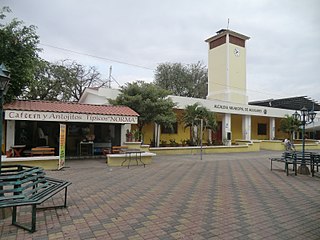
Aguilares is a municipality in the San Salvador department of El Salvador, located 33 km away from the city of San Salvador. The municipality measures 33.72 km² and as of 2006, had an estimated population of 73,300. Sugar cane cultivation is the major economic activity for the area.

Opico is a municipality in the La Libertad department of El Salvador.

Club Deportivo Atlético Marte, also known as Atlético Marte, is a Salvadorian association football club based in San Salvador.

The National Civil Police of El Salvador, also known as PNC, is the national civilian police of El Salvador. Although the National Civil Police is not part of the Armed Forces of El Salvador, it constitutes along with them the "Civilian Force". It was created after the Peace Accords were signed at Chapultepec Castle in Mexico City on January 16, 1992, and began the operations on February 1, 1993, in order to guarantee the order, safety, and the public tranquility for every single corner of El Salvador. The PNC is a replacement of the National Police of El Salvador.
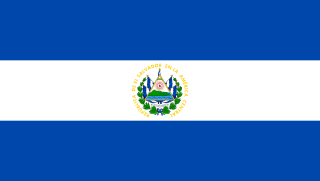
Salvadorans, also known as Salvadorians, are citizens of El Salvador, a country in Central America. Most Salvadorans live in El Salvador, although there is also a significant Salvadoran diaspora, particularly in the United States, with smaller communities in other countries around the world.
Ramón Ulises Flores Aguirre is a Salvadoran former footballer who played as a right-back. He was banned for life in 2013, for match-fixing while playing for the El Salvador national football team.

Salvador Sánchez Cerén is a Salvadoran politician who served as the 42nd President of El Salvador between 1 June 2014 and 1 June 2019. He took office on 1 June 2014, after winning the 2014 presidential election as the candidate of the left-wing Farabundo Martí National Liberation Front (FMLN). He previously served as Vice President under President Mauricio Funes from 2009 to 2014. He was also a guerrilla leader in the Civil War and is the first and only ex-rebel to serve as president.

Salvadoran Spanish is geographically defined as the form of Spanish spoken in the country of El Salvador. The Spanish dialect in El Salvador shares many similarities to that of its neighbors in the region, but it has its stark differences in pronunciation and usage. El Salvador, like most of Central America, uses voseo Spanish as its written and spoken form, similar to that of Argentina. Vos is used, but many Salvadorans understand tuteo. Vos can be heard in television programs and can be seen in written form in publications. Usted is used as a show of respect, when someone is speaking to an elderly person.
Óscar Elías Cerén Delgado is a Salvadoran professional footballer who plays as a midfielder for Primera División club Isidro Metapán.

Darwin Adelso Cerén Delgado is a Salvadoran professional footballer who plays as a defensive midfielder for Primera División club Águila and captains the El Salvador national team. He is the most capped player in El Salvador history.

El Salvador–Mexico relations are the diplomatic relations between El Salvador and Mexico. Both nations are members of the Association of Caribbean States, Community of Latin American and Caribbean States, Organization of American States, Organization of Ibero-American States and the United Nations.
Ibsen Adalberto Castro Avelar is a Salvadoran professional footballer who plays as a defender for Primera División club FAS.

Tourism accounts for a large part of El Salvador's economy. El Salvador has many natural attractions including beaches with some of the best surfing breaks on the Pacific Coast. El Salvador offers many lush forests shrouded in cool temperatures with abundant wildlife and scenic mountain-top vistas. El Salvador also has great potential in the field of cultural tourism; with over 2,000 known archaeological sites, mostly of the Maya and Olmec cultures. These sites are of international interest for their easy access and well-preserved remains.
Andrés Alberto Flores Jaco is a Salvadoran professional footballer who plays as a defender for Primera División club FAS and the El Salvador national team.
Brenda Damaris Cerén Delgado is a Salvadoran professional footballer who plays as a forward for Mexican Liga MX Femenil club Atlas and the El Salvador women's national team.
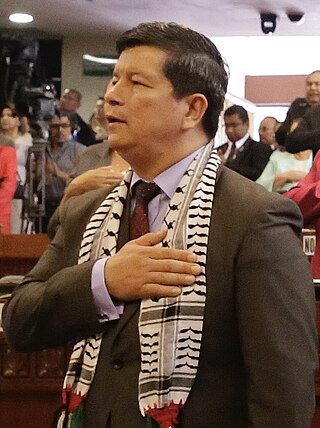
Juan Manuel de Jesús Flores Cornejo, nicknamed "El Chino", is a Salvadoran politician. As a member of the Farabundo Martí National Liberation Front (FMLN), Flores served as the mayor of Quezaltepeque from 2003 to 2012 and then later as a deputy of the Legislative Assembly from La Libertad from 2012 to 2021. He is currently a presidential pre-candidate for the FMLN for the upcoming 2024 general election; his running mate is Werner Marroquín. Flores supports El Salvador further strengthening relations with the People's Republic of China.
